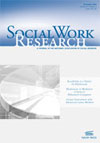 Scholars have declared that a father’s physical absence from home as one of the greatest social problems in the United States. Although the impact of unmarried parents on children is of concern generally, this is seen as being more problematic for certain groups of color. Data from the National Vital Statistics Reports indicated that in 2006 nearly 65% of Native American children were born to unmarried parents. This is the second highest percentage for non-marital births in the US (the highest percentage being that of African Americans, at 70%). However, few studies have examined the impact of unmarried fatherhood in Native American families, particularly those living in urban areas.
Scholars have declared that a father’s physical absence from home as one of the greatest social problems in the United States. Although the impact of unmarried parents on children is of concern generally, this is seen as being more problematic for certain groups of color. Data from the National Vital Statistics Reports indicated that in 2006 nearly 65% of Native American children were born to unmarried parents. This is the second highest percentage for non-marital births in the US (the highest percentage being that of African Americans, at 70%). However, few studies have examined the impact of unmarried fatherhood in Native American families, particularly those living in urban areas.
In a recent study by Jonathan Padilla, Peter Ward and Gordon E. Limb, published in Social Work Research (Volume 37, Number 3; September 2013), the authors examined the associations among parental relationship quality, father involvement, and co-residence. The authors conducted a multiple group analysis through structural equation modeling comparing 107 Native American fathers with fathers of the general population in the Fragile Families and Child Wellbeing Study.
Noting that while there are hundreds of Native American nations in the US, each with a unique history and heritage, the authors posit that certain generalizations are possible if cautiously made. Two commonalities that may influence parental relationship quality, father involvement, and co-residence are a collectivistic approach to family life and the impact of historical trauma. They note that in traditional indigenous societies, kinship networks expand the parenting system to include more than just the birth parents. This potentially decreases father involvement by diffusing responsibility for interacting with children throughout the kinship network. Also, historical trauma, such as the practice of forcibly relocating Native American children to boarding schools in the 19th and much of the 20th centuries led to little social support from which individuals could learn to develop healthy parenting practices.
Given these factors, the authors arrived at some interesting results. Although the results were similar between ethnic groups, findings indicated two key differences for urban Native Americans:
- Emotional supportiveness appears to be a more salient predictor of a father’s physically active engagement for Native Americans; and
- Parental relationship quality has a stronger association with urban Native American father involvement than does co-residence.
The authors note that urban Native Americans’ experiences with historical trauma, and their collectivistic cultural heritage, have likely led to these two key differences, which suggest in turn two implications for clinical practice. First, the differences underscore the importance of conducting a bio-psycho-social history of the Native American family, including a genogram that will enable the practitioner to determine the extent to which historical trauma has affected the family system. Second, the model suggests that practitioners can most effectively increase father engagement by increasing the couple’s relationship quality, specifically the father’s awareness of the mother’s emotionally supportive behavior and his ability to cultivate that support.



